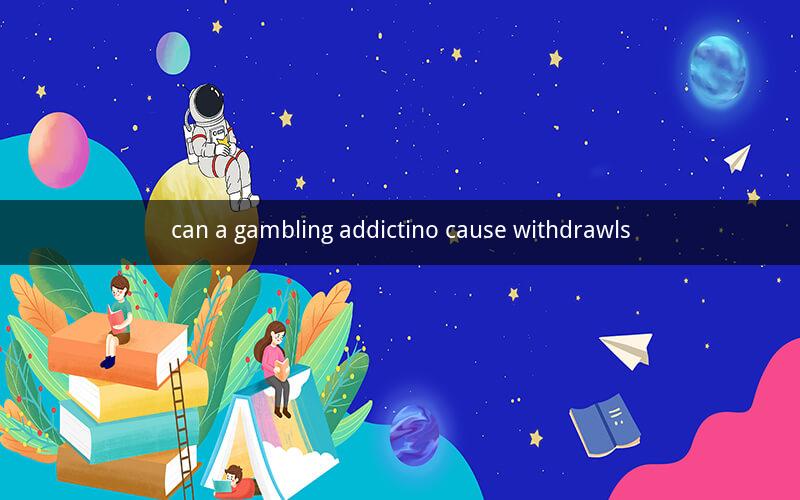
Understanding the Impact of Gambling Addiction on Withdrawal Symptoms
Table of Contents
1. Introduction to Gambling Addiction
2. What are Withdrawal Symptoms?
3. The Link Between Gambling Addiction and Withdrawal
4. Symptoms of Withdrawal from Gambling
5. The Psychological Impact of Withdrawal
6. The Physical Impact of Withdrawal
7. The Social Impact of Withdrawal
8. Coping with Withdrawal Symptoms
9. Treatment Options for Gambling Addiction and Withdrawal
10. Conclusion
1. Introduction to Gambling Addiction
Gambling addiction, also known as problem gambling, is a behavioral disorder characterized by an uncontrollable urge to gamble despite negative consequences. This addiction can manifest in various forms, from casual betting to more severe forms of pathological gambling. Understanding the nature of this addiction is crucial to comprehending its potential impact on withdrawal symptoms.
2. What are Withdrawal Symptoms?
Withdrawal symptoms occur when an individual stops using a substance or engaging in a behavior that they have become dependent on. These symptoms can range from mild to severe and often include physical, psychological, and social components.
3. The Link Between Gambling Addiction and Withdrawal
The link between gambling addiction and withdrawal symptoms is well-documented. When a person with a gambling addiction stops gambling, they may experience a range of withdrawal symptoms that can be as challenging as those associated with substance abuse.
4. Symptoms of Withdrawal from Gambling
The symptoms of withdrawal from gambling can be diverse and may include:
- Intense cravings for gambling
- Anxiety or irritability
- Depression or mood swings
- Difficulty concentrating
- Insomnia or excessive sleepiness
- Restlessness or agitation
- Feelings of emptiness or boredom
- Compulsive behaviors in other areas of life
5. The Psychological Impact of Withdrawal
The psychological impact of withdrawal from gambling can be profound. Individuals may experience feelings of loss, guilt, shame, and despair. These emotions can lead to increased stress and anxiety, further complicating the recovery process.
6. The Physical Impact of Withdrawal
Physical symptoms of withdrawal from gambling can also occur. These may include headaches, fatigue, gastrointestinal issues, and changes in appetite. In some cases, individuals may experience more severe physical symptoms, such as palpitations or high blood pressure.
7. The Social Impact of Withdrawal
Gambling addiction can have a significant social impact, and withdrawal can exacerbate these issues. Relationships with family and friends may be strained, and social isolation can become a problem. The individual may also face financial difficulties and legal consequences as a result of their gambling behavior.
8. Coping with Withdrawal Symptoms
Coping with withdrawal symptoms from gambling addiction can be challenging. Here are some strategies that may help:
- Engage in healthy activities to distract from cravings
- Seek support from friends, family, or support groups
- Practice relaxation techniques such as meditation or yoga
- Establish a routine to provide structure and stability
- Consider professional therapy or counseling
9. Treatment Options for Gambling Addiction and Withdrawal
Treatment for gambling addiction and withdrawal can vary depending on the severity of the addiction and the individual's needs. Common treatment options include:
- Cognitive-behavioral therapy (CBT)
- Contingency management
- Support groups
-药物治疗
- Inpatient or outpatient rehabilitation programs
10. Conclusion
Gambling addiction can lead to significant withdrawal symptoms that can be both physically and psychologically challenging. Understanding the nature of these symptoms and the available treatment options is essential for individuals seeking to overcome their addiction. By seeking help and implementing effective coping strategies, individuals can increase their chances of recovery and lead a healthier, more fulfilling life.
Questions and Answers
1. Q: Can withdrawal from gambling addiction be dangerous?
A: Yes, withdrawal from gambling addiction can be dangerous, especially in severe cases. It's important to seek professional help if you're experiencing withdrawal symptoms.
2. Q: Are there any medications that can help with withdrawal from gambling addiction?
A: While there are no specific medications for treating gambling addiction, some medications may be prescribed to manage symptoms of anxiety or depression associated with withdrawal.
3. Q: How long do withdrawal symptoms from gambling addiction last?
A: Withdrawal symptoms can last for weeks or even months, depending on the severity of the addiction and the individual's response to treatment.
4. Q: Can gambling addiction be cured?
A: Gambling addiction is a chronic condition, but it can be managed and treated effectively. With proper treatment and support, individuals can achieve long-term recovery.
5. Q: Can someone recover from gambling addiction without professional help?
A: While some individuals may recover without professional help, seeking support from therapists, counselors, or support groups can significantly improve the chances of successful recovery.
6. Q: How can I support a loved one who is struggling with gambling addiction?
A: You can support your loved one by being understanding, patient, and encouraging them to seek professional help. It's also important to take care of yourself during this process.
7. Q: Are there any support groups for gambling addiction?
A: Yes, there are several support groups available, including Gamblers Anonymous and SMART Recovery, which provide a supportive environment for individuals struggling with gambling addiction.
8. Q: Can therapy help with withdrawal from gambling addiction?
A: Yes, therapy, especially cognitive-behavioral therapy (CBT), can be highly effective in treating gambling addiction and managing withdrawal symptoms.
9. Q: What are the signs of a gambling addiction?
A: Signs of a gambling addiction may include lying about gambling, hiding gambling activities, spending more time and money on gambling, and experiencing negative consequences as a result of gambling.
10. Q: Can a person develop a gambling addiction without realizing it?
A: Yes, it's possible for a person to develop a gambling addiction without realizing it. It's important to be aware of the warning signs and seek help if there is a concern about problem gambling.